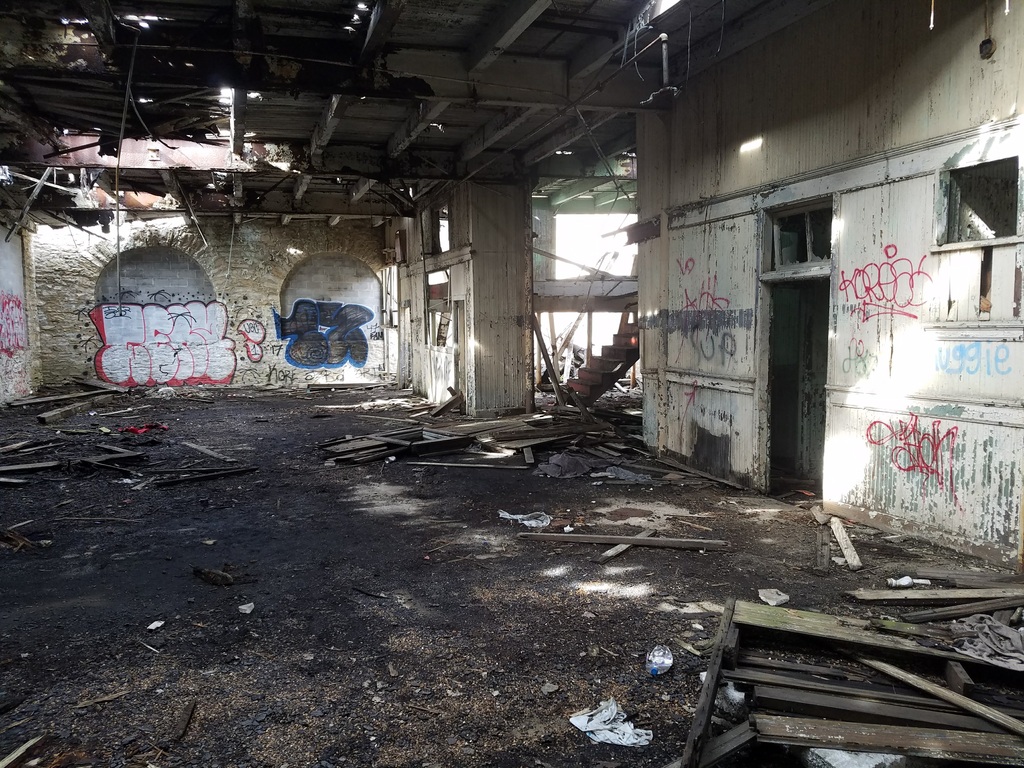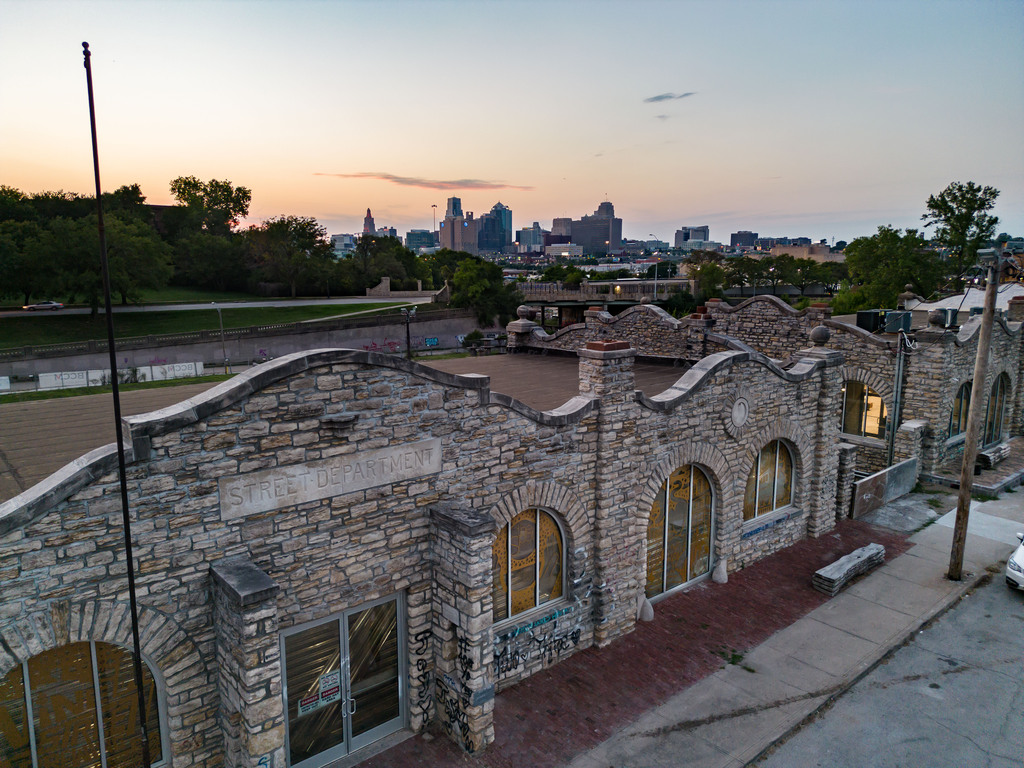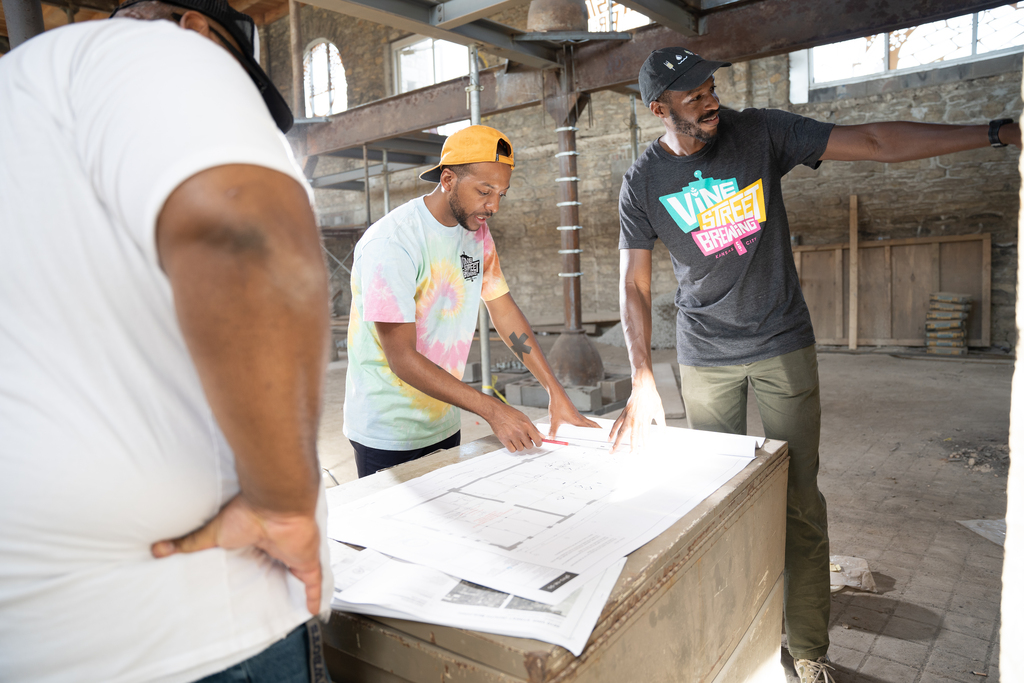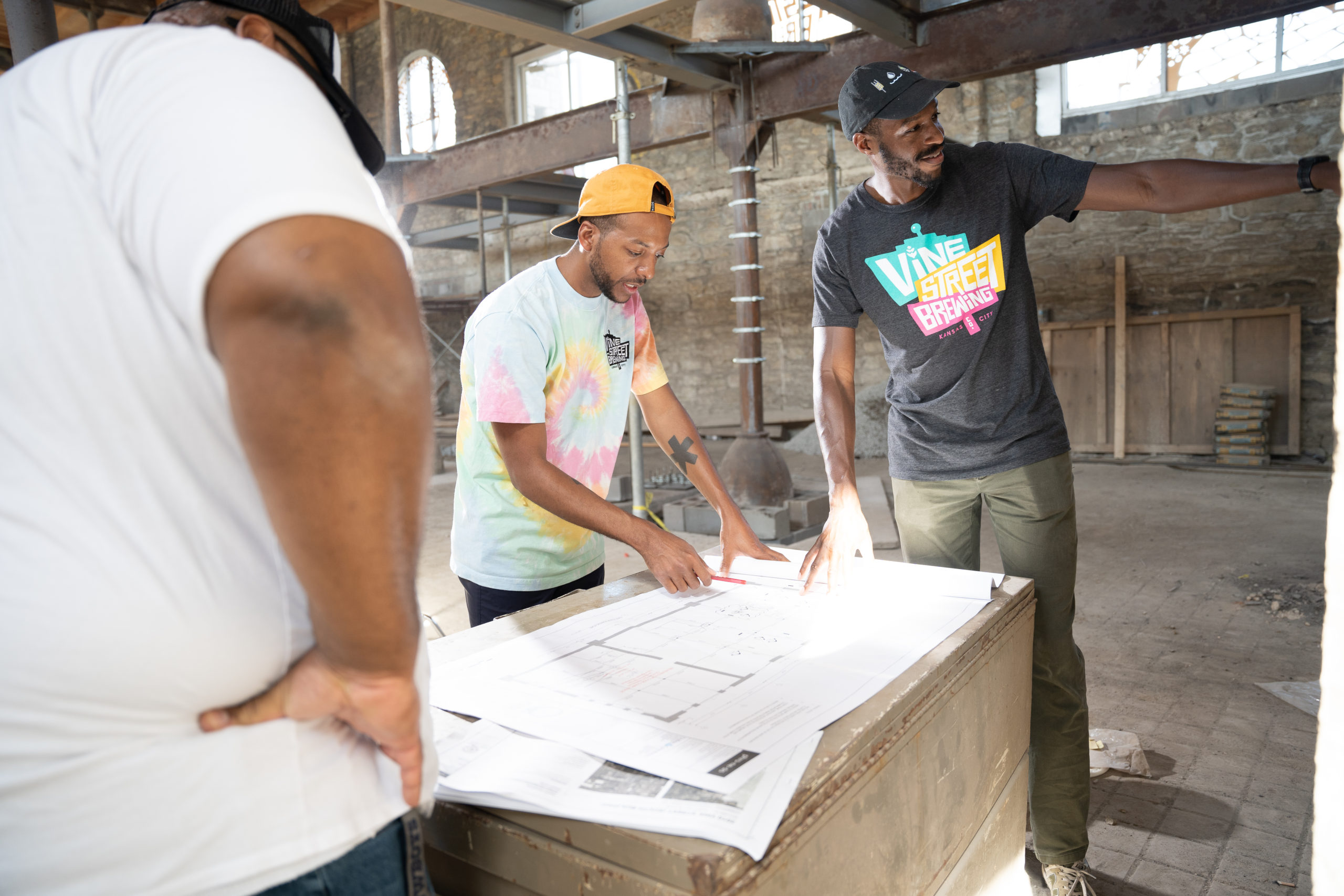Locals and tourists pack Vine Street Brewing’s taproom in Kansas City, Missouri, and sip on Maris Pale Ale and Jazzman Black Lager. Word quickly spread since Missouri’s first Black-owned brewery opened in June 2023, making headlines across the country. Vehicles line the streets, a sign of economic invigoration in a once-overlooked area less than two blocks from Kansas City’s historic 18th and Vine District.
Vine Street Brewing founders Woodie Bonds, Elliott Ivory, and Kemet Coleman overcame multiple hurdles to reach this point. It started with massive redevelopment at their 2000 Vine property and connected to a legacy and living history painstakingly established by prior generations.
Decades ago, Black economic activity in the District coalesced, prospered, and eventually floundered. Today, ongoing Black-led economic empowerment by civic leaders and private investment is paving the way. Vine Street Brewing and entrepreneurial neighbors at 2000 Vine are building on those commitments. Representation has led to reclamation. The voice of the brewery joins a community choir that slowly, steadily, is deactivating segregation and racist policies in the neighborhood by advancing economic progress that uplifts Kansas City.

From the Ruins
When real estate developers Shomari Benton, Tim Duggan, and Jason Parson acquired the City’s two oldest public works buildings in 2016, they took possession of derelict shells. Built in 1866 on a two-acre property, 2000 Vine’s dual structures had been abandoned since 1978. The south building had no roof or windows. Shattered glass and trash were strewn across barren floors. Graffiti marred rough-hewn limestone walls.
The developers removed trash and installed new windows and a ceiling. After three years of extensive restoration totalling $5 million, Benton and his partners signaled interest in having a brewery as a tenant.
“Activating the site in the proper way, with occupants who had roots in the community, would go a long way in establishing a successful future. Thankfully, Vine Street Brewing fit that bill,” Benton said.
When Coleman, Bonds, and Ivory toured the space, the building still “looked like a ruin inside and the floor was in rough shape.”
Bonds, who shares brewing duties with Ivory, said it was “hard to see the future of what [the building] could become.” Undeterred, the brewers signed a 10-year lease.
The redevelopment project aligned with the brewery founders’ goals. “When I walked in, it just felt like home to me. I also wanted to be impactful in a community. I just knew what this could mean for this area,” said Bonds.
2000 Vine is now home to an event space, Warren Harvey Art Gallery, Duggan’s urban planning and design business, Benton’s law firm, Parson’s public relations firm, The Spot coffeehouse, Keno G tattoo shop, and other businesses.
Vine Street Brewing is nestled in 4,801 square-feet of the south building that still bears reminders of its past. Whiskey Design guided the owners through a branding exercise “that allowed us to put historical, musical, cultural, and personal elements into the source code of our brand,” Coleman said. “Inclusivity is important to us. We know that natural light, color, cleanliness, good beer, and music set the tone for a welcoming environment.”

The 2000 Vine property after acquistion in 2016.
While visible, the ground-level brewhouse isn’t a centerpiece of the taproom’s layout but instead a background fixture. Vaulted ceilings allow room to breathe, a sprawling courtyard invites guests to groove to live music and DJs. Upper- and lower-level taprooms await those ready to drink and discuss life. Cozy nooks and tables welcome warm conversations.
Walls sport green, yellow, and purple colors associated with New Orleans, an allusion to Kansas City’s storied jazz history. Hefty vertical wooden beams cut in the shape of piano keys separate the upper taproom from adjacent lounge space. Depictions of Afro beer goddess Maris exude benevolence. Warren Harvey’s vibrant paintings highlight Black faces and culture. Graffiti remains on the walls, a conscious acknowledgement of the past.
Strive to Thrive on Vine
Vine Street Brewing’s owners received a Small Business Association loan to fund the brewery, covering less than 50 percent of the overall expense. Tenant improvement costs were folded into the brewery’s lease. Combined, the nearly $1 million brewery price tag includes the 2000 Vine team’s investment to upgrade the space on behalf of the brewery owners, the owners’ startup costs, and brewing equipment. (As developers and a wholly separate business, 2000 Vine does not have any ownership of the brewery.)
“We leveraged our connections to guide us through that process. Enterprise Bank did a wonderful job assisting us with our SBA Loan application,” Coleman said.
But even with funding secured, the brewery faced looming project deadlines, shipping delays, and unplanned expenses.
“The timeline of getting this project done was always a concern,” Ivory said. “Quite a bit of work needed to be done to the building.”
Obtaining federal, state, and local licenses was an intense two-year process, particularly during the COVID-19 pandemic. They hired a local attorney, who previously served on Kansas City’s Liquor Control Board, to help procure federal and state licenses.
Construction delays contributed to the often notoriously challenging local licensing process.
Obstacles, such as difficulty acquiring structural steel, “made the timeline hard to predict and caused some stress for the team,” Ivory said. “After construction was behind us, we had issues with utilities and brewhouse equipment.”
Failure of a glycol chiller incurred an additional expense, as the new chiller proved more expensive than the existing one. These delays obstructed the brewery’s ability to obtain a certificate of occupancy, fire inspection, and health permit—all requisite steps before securing a local liquor license. But persistence and professional assistance overcame the owners’ frustration.

Personal Investment
Homebrewing enabled Woodie Bonds to find a supportive like-minded community. Opening a brewery provided a gutsy opportunity to prove to himself what he was capable of.
“Brewing got me through tough times. It became an outlet to express my feelings in a positive way. The opportunity to do this publicly was extremely fulfilling,” Bonds said. “I never thought someone like me would have this once-in-a-lifetime opportunity to do something that was productive for Kansas City.”
Representation also matters to Bonds. “I wanted to [do it for] my daughter. People might try to push you in a box or tell you who you should be as a person because of what you look like. You can be so much more. Vine Street Brewing is a big part of this mission for her and for all people,” Bonds said.
Craft beer’s collaborative community impressed Coleman about 10 years ago. Working as a Boulevard Brewing Guest Relations tour guide inspired ideas about “beer collaborations, beer label artwork, music, concerts, and bringing my culture to the industry,” said Coleman. “As a musician, I loved seeing how supportive beer fans were to their favorite brewery or beer.”
Ivory admitted doubts about whether he would ever brew professionally. “I had been wanting to get involved in the industry. Even though I was nervous, I was glad that Woodie approached me with this opportunity,” Ivory said.
Through the brewery, Ivory hopes to inspire “new craft beer drinkers to feel welcome and invited into the scene to become beer nerds. I want people to understand where the beer comes from, how it’s made, and how it can change.”
That said, beer nerdery only goes so far in a mature craft beer market seeking to attract a wider audience.
In addition to good beer that quenches thirst, Vine Street Brewing’s secret sauce is its brand voice and taproom experience. Inclusivity is intentional. Offering a representative social, historical, and cultural space entices diverse guests interested in craft beer and an experience that isn’t yesteryear’s white-male-dominant craft beer culture. The brewery and its 2000 Vine neighbors are a magnetic lodestone, fostering a sense of belonging that attracts its community.
Acknowledging Legacy, Advancing Progress
Vine Street Brewing and 2000 Vine’s other tenants are important stepping stones on a long rocky road for the Black community in and around 18th and Vine.
Kansas City’s pioneering style of jazz emerged here during the 1920-30s. Luminaries Charlie “Yardbird” Parker, William “Count” Basie, Julia Lee, Jay McShann, and others performed in nightclubs. Kansas City defied Prohibition as bootleg booze flowed, gambling flourished, and jazz sizzled.
Black families and businesses crammed into the densely populated Vine Street neighborhood, concentrating economic livelihoods as a result of residential segregation. Nearby Troost Avenue is a well-documented racial boundary. 27th Street once represented the southernmost limit where Black families could live.
Black doctors, dentists, and other professionals provided services to a predominantly Black population. More than 600 businesses, hotels, and theaters operated in the neighborhood. Established in 1919, The Kansas City Call newspaper still operates in the area as one of the country’s oldest African-American newspapers.
Today, nearby restaurants like iconic Arthur Bryant’s Barbeque and attractions—the Gem Theater, The Blue Room jazz club, and Mutual Musicians Foundation—form a powerful cultural nexus. Combined, the American Jazz Museum and Negro League Baseball Museum attract nearly 300,000 annual visitors.
“Vine Street Brewing honors Vine Street’s proud past and present. That, mixed with the music, food, retail, and cultural points-of-interest, adds to the vitality that has been the underpinning of the neighborhood,” Benton said.
New residential and commercial construction amplifies the uptick in the District’s economic activity. The brewery’s timely opening deftly steps to the beat of the neighborhood’s revitalization.
“We have a huge responsibility to preserve and protect the District’s history and culture,” Bonds said. “Economically, I hope this brings more people here not just for us but for this whole District and community. There are fantastic businesses that we hope [people] will check out.”
“The essence of Vine Street Brewing is rooted in the synergy of music, culture, and history. Our identity is an ode to Kansas City’s 18th & Vine district and the spirit that made it thrive,” Coleman said.
Kansas City’s history here is shaped by Prohibition, jazz, art and commerce, family residences, and civic leadership by Congressman Emanuel Cleaver, Kansas City’s first African-American mayor who led the District’s early revitalization efforts in the 1990s. Brought back from rubble and neglect, the resurrection of 2000 Vine represents a conduit between past and present shepherded by artists, entrepreneurs, and developers.
“I find a deep connection through my mom’s family’s ties to the Lower Ninth Ward in New Orleans. The history of 18th & Vine, with its magnetism for jazz artists from New Orleans seeking refuge from Prohibition, is interwoven with my passion for enhancing Kansas City’s cultural identity,” Coleman said. “Our goal is to position Vine Street Brewing as a cultural haven, uniting diverse communities through the power of music, art, and craft beer.”

Photo credit: Vine Street Brewing.
Leaderships Stimulates Growth
The arrival of a Black-owned brewery is long overdue in Kansas City, where Black people constitute 26 percent of the city’s population. Nationwide, few Black people work in the craft beer industry. According to a 2019 Brewers Association survey, less than one percent of the nearly 8,500 craft breweries at the time in America were Black-owned. Slightly more than four percent of industry employees were Black.
That context highlights the importance of Vine Street and underscores its relative isolation. Ivory, Bonds, and Coleman lack an extensive network of Black industry peers who can offer guidance. Undaunted, they manifest roles as groundbreaking leaders in craft beer and their community.
“I have been in manufacturing for the past 10 years. You rarely see black leadership in this field. I think we are in a unique position to talk about the technical aspect of brewing and the supply chain as well as being creative in the field as well,” Ivory said.
The brewery founders’ goal is to set a standard for real estate and economic development in East Kansas City.
“We are a manufacturing facility with a customer-facing space that welcomes the entire spectrum of people. We are just one example of how a business and the city that supports it can begin to peel back the layers of geographic racism and actually bring our city closer together,” Coleman said. “I believe that creates value for every single person in this city.”
This story was made possible by the Diversity in Beer Writing Grant, established by the North American Guild of Beer Writers (NAGBW). To learn more about this program, visit nagbw.org. Support for the Diversity in Beer Writing Grant is provided by Crafted For All, Craft x EDU, Allagash Brewing Company, and the Brewers Association.


